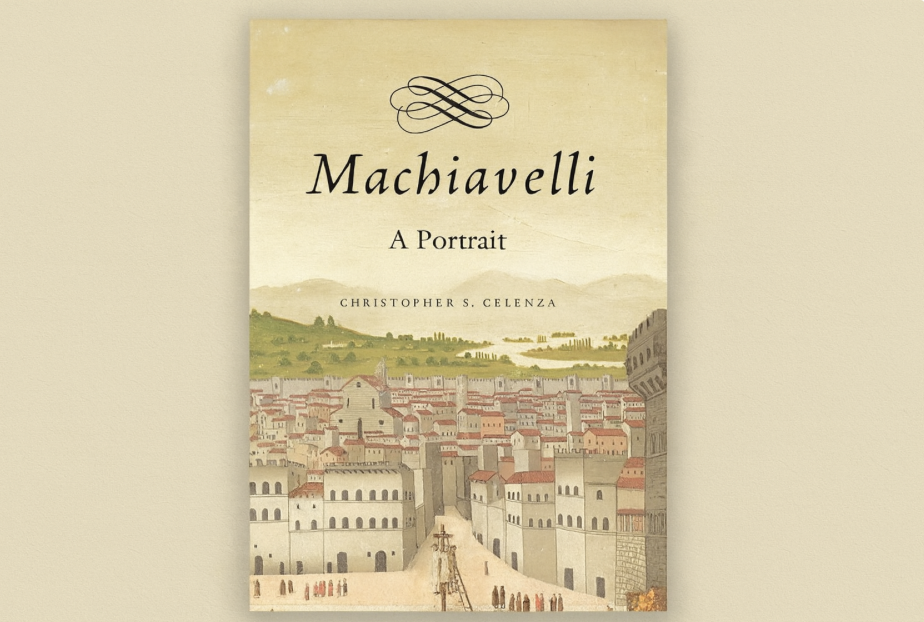

While in Italy, with Professor Celenza’s study of Machiavelli as my companion, I journeyed to the modest villa where the Florentine thinker endured his exile. In a dim room, I stood before his desk. Its grain was worn smooth by years of restless hands and restless thought. This was the very surface upon which The Prince first took form. Thoughts of his banishment from Florence lingered in the air, binding the place to its history.
With expectation, I stepped into the garden. The Arno valley stretched outward in sunlit folds. In the distance, the city itself glimmered, at once both near and unreachable. I imagined Machiavelli, too, his gaze tender and unrelenting, fixed upon that horizon, longing for Florence.
It is from this vantage, geographical and imaginative, that Professor Celenza’s book acquires its particular resonance. His study does not treat Machiavelli as the marble bust of political cliché, but as a living man caught between disappointment and invention, banishment and vision. To read his work in the shadow of that desk and under the Tuscan sun is to feel the immediacy of exile. It allows one to sense how The Prince arose not from cold calculation but from a restless heart confronting the fragility of power.
What follows is a book review I wrote while in Tuscany as I completed reading Professor Celenza’s fine volume. That review was later published in the Journal of Faith and the Academy 9, no. 1 (Spring 2016): 77–80.
Book Review
Christopher S. Celenza, Machiavelli: A Portrait (Cambridge, MA: Harvard University Press, 2015), 240 pp., $24.95.
Ruthless and amoral are among the first ideas to emerge when thinking of the term “Machiavelli.” This Renaissance bad boy rerouted the concepts of political science when he penned The Prince as an offering of thought for Lorenzo de Medici.
Christopher Celenza begins this fascinating read by commenting,
He [Machiavelli] was arrested, imprisoned, and subjected to the strappado, that ingenious form of torture whereby your hands are tied behind your back, you are lifted up into the air by a rope on a pulley, and you are then dropped almost, but not quite, to the ground. At that final moment, the rope is jerked tight, and your arms almost come out of their sockets. Machiavelli was dropped six times (2).
From the beginning of this work one steps back in time to the world of Machiavelli. It is not until the last paragraph has been read that the reader realizes the full commanding intellect of Machiavelli and the comprehensive, story-like narrative as a portrait of Machiavelli. Dr. Celenza has provided a masterful work, even fresh portrait of a man so often misunderstood.
In the chapter entitled “Renaissance, Conspiracies, Bonfires,” Celenza suggests that in all likelihood the reader of his work has “never witnessed a public execution,” experienced physical torture, or lived in “a world where war is on your doorstep” (4). These are but a few ways in which Machiavelli’s world differs from ours.
The language of the church fathers was Latin. As a result the Christian church fostered the engagement of the Latin language in early eighth century which led to the decline of classical Latin (8). By the eleventh century this decline was beginning to reverse as evidenced by the works of Aristotle being translated from Greek into classical Latin (9). By early thirteenth century scholars concentrated in Paris, Oxford, Bologna, Salerno, and Naples forming the first universities (9). Paris became the nexus for theology while Bologna emerged as the centre for law and Salerno for medicine (10). Latin became the conduit for the birth of Renaissance humanism (11).
“Highs and Lows: Machiavelli Emerges” notes that a “sense of the instability of governmental life never left him, and it made its way into everything he later wrote” (33). An early instability was the execution of Savonarola, the nascent positioning of Soderini, his appointment as Florentine secretary, the empowerment of Cesare Borgia and his ultimate demise and the execution of Giuliano della Rovere whereby “once more Italy became a chessboard on which the strategies of the powerful would be enacted” (38).
“Interlude” explores Machiavelli as a man of letters. In particular, a letter to his friend Vettori (57). Machiavelli writes of his sitting by the spring. Here he reads Dante, Petrarch, Tibullus, Ovid, or others. He read a light classic many times to reflect on his own life. His favorite historian was none other than Livy (89).
Celenza shares what may be the best known part of the letter regarding the conclusion of his day:
Once the evening has arrived, I come home and enter my study. In the entryway I take off my daytime clothing, covered with mud and dirt, and I put on garments that are royal, and suitable for court. Changed into suitable clothes, I step into the ancient courts of ancient men. Received lovingly by them, I nourish myself on that food that alone is mine, for which I was born. There I am unashamed to talk with them and ask them the reasons for their actions, and they, with their humanity, answer me. For four hours I feel no boredom, I forget all worries, I do not fear poverty, and I am not dismayed by death. I give myself to them entirely (59).
This is among my personal favorite texts of Machiavelli’s writings. Celenza beautifully draws the conclusion, “The picture drawn is a solitary intellectual [who] was totally alone when it came to the reading and writing that led to The Prince” (63).
The chapter entitled “The Prince” explores the most famous of all work by Machiavelli which was never published during his lifetime (63). Four concerns weave as a thread through The Prince: to observe the world as it really is rather than simply what we wish it could be, the influence of individuals to shape events, the use of power, and the instability of the world (73).
Dr. Celenza discusses Machiavelli’s views on God. He comments, “God is unimportant to Machiavelli. He is no atheist, needless to say, an identity that was foreign to the era. He simply brackets God...to write him out of the picture” (78). He is no advocate for the institution of the Catholic church because of the loss of “all devotion and all religion” (128).
In the Discourses, Machiavelli “suggested that Christianity’s value system was off” (174). In the chapter entitled “Ghosts” Celenza discusses the ghost of Christianity. Machiavelli did not care about theology but felt that “contemporary Christianity was not helping things in political terms” (197). In the present scholarly climate there are authors who promote a value system more secular than sacred. While the emergence of the secular was in motion it cannot be denied that the sacred was emerging as well. Thus the renaissance, or rebirth. Celenza offers a structural thought regarding this era: “You simply could not be raised in Renaissance Christian culture without having the idea drummed into you that there was a salvation-oriented ideal available” (198).
In “Conversing with the Ancients” Celenza writes of Machiavelli’s Discourses on the First Decade of Livy (102). With great precision he comments, “Livy’s world was Machiavelli’s” (115). Machiavelli designated Livy as uomo sagace e inquieto, or “a man shrewd and restless” (110). In his Discourses, Machiavelli writes: “It is not what is good for an individual that makes cities great but what is good in common, and there is no doubt that this common good is not realized except in republics” (117). The Discourses “reflect Machiavelli’s deep, repeated reading of that [Livy’s History] classic. He has the text beside him when he writes, and he often quotes Livy verbatim, many times in Latin (118).
Livy wrote, “through the constant succession of new historians, who believe either that in their facts they can produce more authentic information, or that in their style they will prove better than the rude attempts of the ancients (Livy, History of Rome, 1:3). As an almost prophetic utterance Livy comments, “And if in so vast a company of writers my own reputation should be obscure, my consolation would be the fame and greatness of those whose renown will throw mine into the shade” (Livy, History of Rome, 1:3). These words were penned by Livy 1500 years before the time of Machiavelli. What a tremendous testimony to Livy’s work that Machiavelli would sit for hours in the evenings to write his Discourses alongside the mind of Livy. Machiavelli did not throw Livy’s fame and greatness in the shade rather he continued the legacy of one of the world’s finest historians.
In the chapter entitled “The Comedy of Life,” Celenza discusses “letters and plays, wives and lovers” anchored in the thought of di cosa nasce cosa, or one thing begets another (134). In a thought of summation, Celenza states that “Marriage existed, in Machiavelli’s era...to pass on property, to bear children, and to ally families who desired to be linked for social or political reasons. Romantic love was not the point” (142).
Machiavelli was invited, as chronicled in the chapter entitled History, by the Medici “to become the official historian of Florence, a position that a number of former chancellors of Florence had held. Thus, he could feel part of the system again…. His Florentine Histories- again, unpublished during his lifetime- represent his final masterpiece” (167). The work required three years for authorship (169).
His predecessors in chancery posts included Leonardo Bruni and Poggio Bracciolini each of which “had written histories of Florence in elegant humanist Latin” (169). But he found them lacking in the area of his interest. Bruni and Bracciolini “were quite diligent when it came to describing the wars that the Florentines waged” (170). However, “when it came to civil discord and enmities internal to the city of Florence...they were basically silent about the latter and said little to nothing about the former” (170).
A most interesting discussion involves the word virtu. Celenza comments, “States rise and they fall, in other words, taking their beginnings from the efforts of heroic men who possess virtu” (171). In this context, virtu means “old school, masculine, martial virtue, with emphasis on vir- ‘man’” (171).
In conclusion, Celenza says, “History shaped his internal life and mental outlook profoundly” (211). Further, “Machiavelli as “historico, a person subject to and involved in history, who believed, however improbably, that by interpreting the past sagely, one could act more fruitfully in the present” (211).
Thus ends this work Machiavelli: A Portrait. A fine work indeed. I highly recommend it as a work of modern scholarship and an excellent contribution to the library of thought concerning Machiavelli and Renaissance scholarship.

